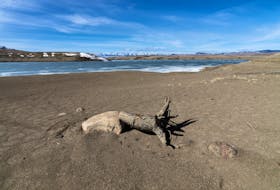KENTVILLE, N.S. — Kings North MLA John Lohr says he wants to see the province collecting more data on motor vehicle collisions to determine whether winter tire use has an impact on crash numbers.
Quebec made winter tire use mandatory in 2008 “Quebec did a study over a number of years, and found a disproportionate number of accidents in the winter involved cars with all-season tires,” Lohr said.
“I believe that we're in the same situation, but the reality is that we've never collected the data.”
Lohr has asked the Transportation Department to change the motor vehicle accident reporting form to include tire types.
“After a couple of years we would have the date to know if we have a problem in Nova Scotia or not, and if we have a problem then we could address it.”
Winter tire use was already at about 90 per cent before the law was enacted in 2008, “so that remaining number were causing half the accidents, or something like that,” he said. “It was clear that the tires were a factor in Quebec, so it moved to legislation that required everyone to have winter tires.”
A 2012 report from the Traffic Injury Research Foundation found that the number of people killed or seriously injured in winter collisions in Quebec after the law was passed dropped by more than 35 per cent.
Lohr said he realizes there are concerns with up-front costs for requiring car owners to have two sets of tires, but that each will last twice as long because they're only on for half the year, and cars get better mileage with winter tires on in the cold weather and all-seasons the rest of the year.
It could also slow the growth in insurance premiums if crash numbers drop, Lohr said, and could mean fewer people going to hospital for treatment of injuries and reducing pressure on the health-care system.
“My point is more, let's find out if we have a problem or not before we make a decision or not,” he said. “This information should be available to us.”
But, he says, from what he sees and hears he thinks there is a problem.
“I wouldn't be pushing it if I didn't think it was an issue,” he said. “To be fair, I don't know if it's a huge issue or a minor one.”
He said he's asked the Transportation Department a few times to change the reporting form to collect the data, but didn't get anywhere.
In an email, department spokeswoman Marla MacInnis said the collision reports used by police are based on the Canadian National Database, and the standardized data elements are consistent across the country.
Those don't include information on the type of tire, “however, there is a data element where police can indicate if the tires on a vehicle are considered to be a contributing factor to a collision,” MacInnis said.
She said the department “intends to adhere to the national standards and is not considering the addition of a data field for tire type at this time.”
Requiring motorists to have winter tires ”is not something we are considering at this time. Many drivers use winter tires already without legislation.”
Amanda Dean with the Insurance Bureau of Canada said the entire industry supports anything that improves road safety, and winter tires have been proven to stop a vehicle 40 per cent better in snow than all-seasons.
She said a 2018 report by the Tire and Rubber Association of Canada found that like Quebec before its law was passed, the number of Atlantic Canadians who used winter tires was high at 94 per cent. There were no numbers just for Nova Scotia.
“That is very high, so making something mandatory may be redundant,” she said.
There are no public studies or numbers that she was aware of that compared winter collisions numbers between winter and all-season tires.
Dean said some insurance companies will provide discounts to customers who use winter tires.
RELATED:









